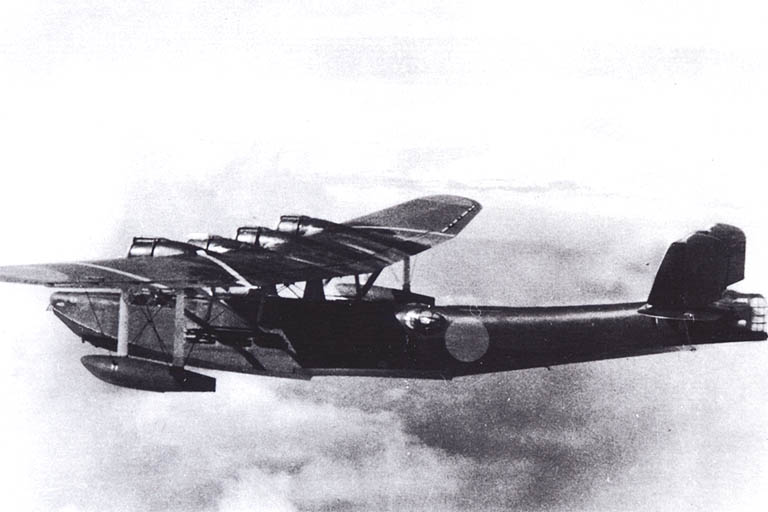As with the Sunderland, the countermeasure would be to fly near sea level.The H6K had an Achilles Heel like most flying boats - no lower turrets because of the hull.
The best attack solution would be a climbing attack from astern (rear gunner can't depress the cannon far enough).
Also, like most flying boats, the bulk of their fuel is stored in the hull.
Navigation
Install the app
How to install the app on iOS
Follow along with the video below to see how to install our site as a web app on your home screen.
Note: This feature may not be available in some browsers.
More options
You are using an out of date browser. It may not display this or other websites correctly.
You should upgrade or use an alternative browser.
You should upgrade or use an alternative browser.
Kawanishi H6K Mavis flying boat v Blenheim IF long range fighter
- Thread starter Fatboy Coxy
- Start date
Ad: This forum contains affiliate links to products on Amazon and eBay. More information in Terms and rules
More options
Who Replied?GrauGeist
Generalfeldmarschall zur Luftschiff Abteilung
Once they discovered they were under attack.As with the Sunderland, the countermeasure would be to fly near sea level.
But like most maritime patrol aircraft, they typically operated at altitude in order to scout.
Escuadrilla Azul
Tech Sergeant
- 2,120
- Feb 27, 2020
Ah, copy that, I misunderstood you. My mistake.
I vaguely remember reading something somewhere that stated the Dutch/Indonesians had one or two operational post-war?
Ah, Yup. answered my own question...
"Air Service Volunteer Corps - A single H6K5 flying boat was restored to flight by Indonesian forces during the Indonesian War of Independence."
Picture:

Kawanishi H6K - Wikipedia
en.wikipedia.org
From here:

Kawanishi H6K - Wikipedia
en.wikipedia.org
It says that one H6K2-L was found by british forces in an hangar in Java with indonesian markings but with no operational record of use or if it flew at all with them. It was painted with british markings and flown to Singapore and no more is told about it.
The L denoted a transport aircraft but at least one Mavis survived the war.
t says that one H6K2-L was found by british forces in an hangar in Java with indonesian markings but with no operational record of use or if it flew at all with them. It was painted with british markings and flown to Singapore and no more is told about it.
Possibly Azul, although the passage that Graeme has found above suggests they are two different aircraft?
Taking a quick look in Butler's War Prizes, the entries don't clarify matters much, but hint at the two aircraft in the images are in fact the same machine, the book stating that the ATAIU flew an H6K, which was found at Surabaya and was made airworthy by 3210 Servicing Commando, it was marked in Indonesian markings and was flown to RAF Seletar, Singapore where it survived for some time, apparently its hull was used as a floating headquarters by the local RAF sailing club. A couple of pages away is the images above that Graeme posted, the bottom one commonly appearing in references on the type and describing the painting of the blue stripe on the fuselage flash by the Dutch.
Escuadrilla Azul
Tech Sergeant
- 2,120
- Feb 27, 2020
Possibly Azul, although the passage that Graeme has found above suggests they are two different aircraft?
Taking a quick look in Butler's War Prizes, the entries don't clarify matters much, but hint at the two aircraft in the images are in fact the same machine, the book stating that the ATAIU flew an H6K, which was found at Surabaya and was made airworthy by 3210 Servicing Commando, it was marked in Indonesian markings and was flown to RAF Seletar, Singapore where it survived for some time, apparently its hull was used as a floating headquarters by the local RAF sailing club. A couple of pages away is the images above that Graeme posted, the bottom one commonly appearing in references on the type and describing the painting of the blue stripe on the fuselage flash by the Dutch.
Indeed, the photo in "Japanese aircraft in foreign service" is the same that the lower in
Regarding the final use of the Mavis, very appropiated that ended as a RAF yachting club base!
- Thread starter
- #27
Fatboy Coxy
Airman 1st Class
- 140
- Aug 24, 2019
Well the Blenheim would need an appreciative difference in speed firstly to close with the Mavis, and then secondly to manoeuvre into favourable passing attacks., while the Mavis would like a fast speed to run away. With her four gun pack I think she'd have enough hitting power to take the Mavis down.Apparently speed has little to do with the combat. Elsewhere on this forum are accounts of B-17s and B-24s attacking Japanese flying boats with less than the desired results by the US crews. Reminded me of old sailing ships broad siding each other.
Users who are viewing this thread
Total: 1 (members: 0, guests: 1)
Similar threads
- Replies
- 5
- Views
- 2K
